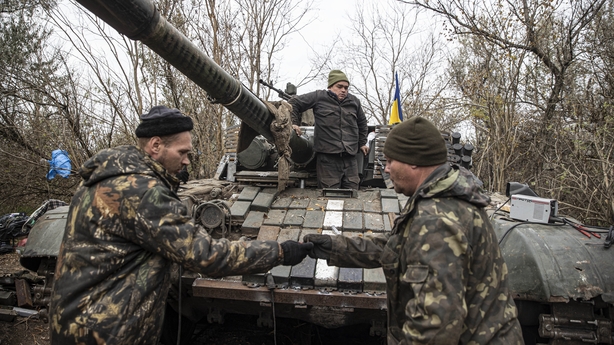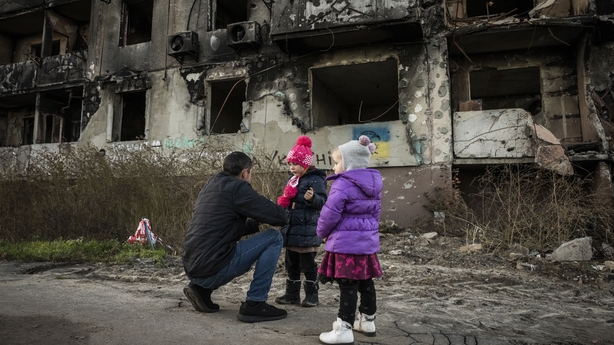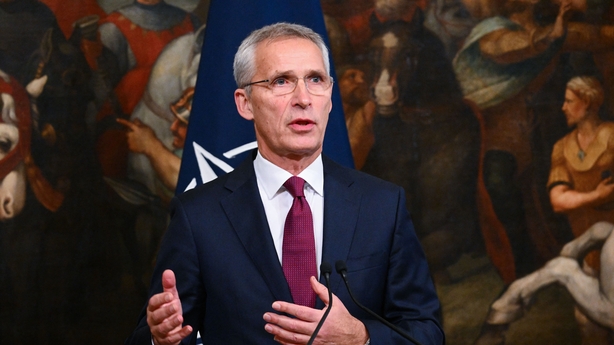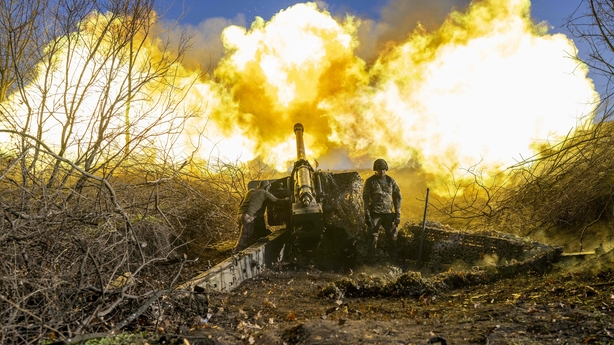Kyiv forces have recaptured more than 40 towns and villages in southern Ukraine, President Volodymyr Zelensky has said, as Moscow signalled its army had begun retreating from the strategic city of Kherson.
The United States meanwhile announced a new $400 million security assistance package for Kyiv, which will include defence systems and surface-to-air missiles, as Ukraine is reeling from massive recent Russian airstrikes targeting key infrastructure.
"Today we have good news from the south," Mr Zelensky said in his daily address to the nation.
"The number of Ukrainian flags returning to their rightful place as part of the ongoing defence operation is already dozens."
Mr Zelensky said 41 settlements have been "liberated" from Russian occupation.
Moscow said it had made the "difficult decision" to pull forces from Kherson, and Russia's defence ministry said its units were manoeuvring in the area.
Ukrainian troops have for weeks been capturing villages en route to Kherson city in the eponymous region, where Kremlin-installed leaders have been pulling out civilians in what Kyiv has called illegal deportations.
The retreat would be a major Russian setback in a region Russian President Vladimir Putin claimed to have annexed, but officials in Kyiv have remained wary, saying Russia was unlikely to leave Kherson without a fight.
In his speech, Mr Zelensky, who has been facing pressure from Western capitals to resume peace talks with Russia, hinted that negotiations were not ruled out if Ukraine regains all its territory.
"We have to go all the way on the battlefield and through diplomacy so that all over our land, along our entire internationally recognised border, our flags -- Ukrainian flags -- are installed," Mr Zelensky said.
He also thanked US President Joe Biden and the American people for the air defence systems.
"Together we're building an air shield to protect civilians," Mr Zelensky said on Twitter.
"We're bringing victory over the aggressor closer."
Latest on Russian invasion of Ukraine
Ukrainian officials have so far mostly been wary in public, warning that Russians may still be planning to sow destruction on their way out.

Mykhailo Podolyak, an adviser to President Zelensky, said today that Russia wanted to turn Kherson into a "city of death", mining everything from apartments to sewers and planning to shell the city from the other side of the river.
"This is what (the) 'Russian world' looks like: came, robbed, celebrated, killed 'witnesses', left ruins and left," he wrote on Twitter.
Russia denies it abuses civilians, despite bombarding residential areas throughout the conflict. It has evacuated thousands of civilians from the Kherson area in recent weeks in what Ukraine says included illegal forced deportations.

Mr Zelensky himself mentioned Kherson just once in his daily overnight television address. Ukrainian forces were strengthening their positions "step-by-step" in the south, he said. "The enemy will make no gifts to us."
'Unpleasant surprise'
Kyiv's public wariness may in part reflect its urge to keep its own operations secret as it plans to inflict as much harm as possible on the thousands of Russian troops likely to need to be transferred across the river by ferry.
Asked about Kherson in an interview with CNN, Mr Zelensky said he could not give details, because "I really want to have an unpleasant surprise for the enemy and not something that they're prepared for".
Russian state media and pro-Kremlin war hawks defended the withdrawal as a necessary move while acknowledging a heavy blow.
The retreat would leave Moscow with only limited gains to show for a "special military operation" that made it a pariah in the West and killed tens of thousands of its soldiers.
Russian forces are still holding on to other gains in the south, including a vital land route connecting Russia to the Crimea peninsula it seized in 2014, and cities in the east that they mostly obliterated while capturing them.
Victory in Kherson may quiet some Western voices calling for Kyiv to negotiate a peace that would cede territory.
Russia coming under heavy pressure - NATO

Earlier today, NATO Secretary General Jens Stoltenberg said Russia is coming under heavy pressure in Ukraine.
Speaking after meeting Italian Prime Minister Giorgia Meloni, Mr Stoltenberg said NATO would be watching in the coming days to see if the Russians did indeed pull back from the west bank of the Dnipro River.
"What is clear is that Russia is coming under heavy pressure and if they leave Kherson it would be another victory for Ukraine," Mr Stoltenberg said.
He added that NATO would support Ukraine "for as long as it takes".
"The unprecedented support that NATO allies, including Italy, has provided is making a difference on the battleground every day and remains vital for the Ukrainian progress," he added.
Ms Meloni, who took office last month, said her government remained committed to defending "the territorial integrity, sovereignty and freedom of Ukraine".

Russia likely committed 'crimes against humanity' in Ukraine - Amnesty
Meanwhile, Amnesty International has said Russia has probably committed crimes against humanity by forcibly transferring Ukrainian civilians in Russian-occupied areas of the country to other regions.
It said civilians were moved from occupied Ukraine further into Russian-controlled areas or into Russia, with children separated from their families in violation of international humanitarian law.
Amnesty said it had been told by civilians they had endured "abusive screening processes", known as filtration, which sometimes resulted in arbitrary detention, torture and other ill-treatment.
"Separating children from their families and forcing people hundreds of kilometres from their homes are further proof of the severe suffering Russia's invasion has inflicted on Ukraine's civilians," said Agnes Callamard, Amnesty International's secretary general.
"Russia's deplorable tactic of forcible transfer and deportation is a war crime. Amnesty International believes this must be investigated as a crime against humanity," she said.
Amnesty said that in one case a woman was separated from her 11-year-old son during filtration, detained, and not reunited with him.
The rights group said it interviewed 88 people, the majority civilians from Mariupol, the Ukrainian Black Sea city seized by Russia after a brutal siege, as well as residents from the Kharkiv, Lugansk, Kherson and Zaporizhzhia regions.
